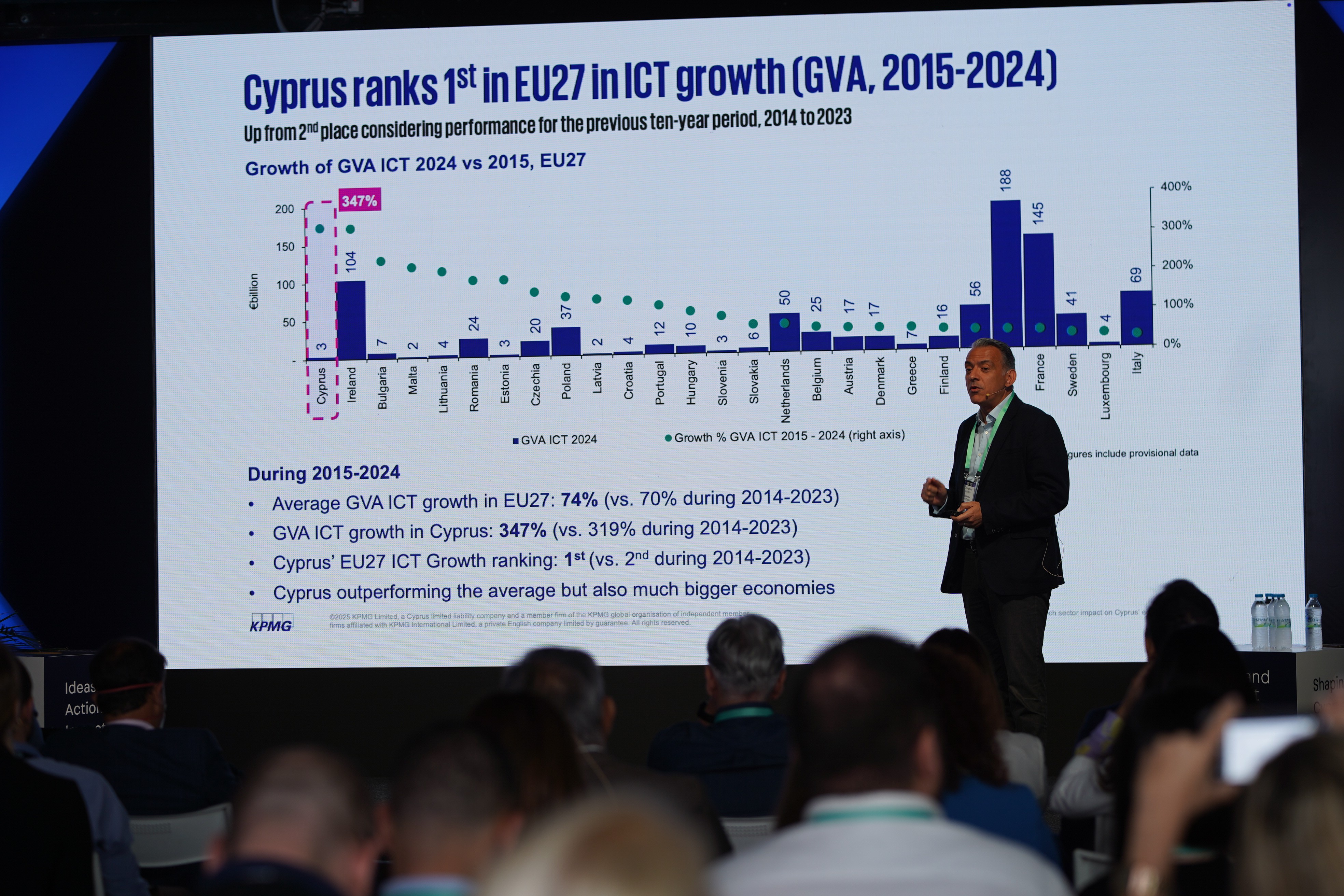Christophoros Anayiotos, Head of Deal Advisory at KPMG in Cyprus, presented the latest economic impact assessment of the island’s tech sector during the TechIsland Summit on Thursday.
According to the 2024 figures, the tech sector contributes 16 per cent of Cyprus’ total Gross Value Added (GVA), a notable increase from 12.6 per cent the previous year.
The overall economic impact of the sector is estimated at €8.5 billion, of which €4.7 billion is generated directly and €3.8 billion indirectly.
These figures are based on the Leontief Input-Output Model and encompass key areas such as information and communication technology (ICT), professional, scientific and technical activities, as well as financial and insurance services related to tech.
The ICT industry alone accounts for €3.4bl of direct GVA, while professional services contribute €840m and financial services €505m, reflecting the increasingly horizontal impact of technology across multiple sectors.
The sector’s resilience was also evident during periods of economic downturn.
In 2020, while the Cypriot economy contracted by 3 per cent due to the pandemic, ICT recorded a 21 per cent growth.
A year later, growth in the sector reached an exceptional 38 per cent.
On employment, Anayiotos explained that the tech sector now supports over 62,000 full-time equivalent jobs in Cyprus, including 45,900 directly and 16,300 indirectly.
For every €1 million in additional tech sector revenue, approximately 13 jobs are created. Within ICT alone, the workforce has risen to 26,000, with professional and technical activities employing a further 15,700 and financial services around 4,200.
However, while total employment has surged, the share of Cypriots in the sector has declined sharply.
In 2015, 88 per cent of ICT employees were Cypriot nationals.


By 2024, this figure had dropped to just 50 per cent, with 42 per cent of roles filled by non-EU nationals and 8 per cent by other EU citizens, a shift that emphasised the growing talent gap and the urgent need for local upskilling.
Cyprus ranks second in the EU27 for ICT’s share of national GVA, which now stands at 11.4 per cent, up from 9.4 per cent in 2023.
The EU27 average remains at 5.4 per cent. Moreover, Cyprus leads the bloc in ICT GVA growth, recording a 347 per cent increase between 2015 and 2024, up from second place in the previous decade.
The country also ranks fifth in the EU for GVA generated per ICT employee, with each worker contributing around €130,000, compared to an EU average of €116,000.
The total number of ICT employees has grown at an annual rate of 12.1 per cent over the past decade, rising from 9,300 in 2015 to 26,000 in 2024.
During the same period, the sector’s GVA tripled, significantly outpacing job growth and indicating increasing productivity.
While ICT specialists now make up 5.4 per cent of total employment in Cyprus, slightly above the EU27 average of 4.8 per cent, the island continues to face a shortage of skilled workers, particularly in high-demand areas such as software development, cybersecurity, and data analysis.
Looking ahead, Anayiotos stressed the need for structural improvements to maintain momentum.
He called for enhanced air connectivity, Cyprus’ accession to the Schengen Area to ease mobility, and the attraction of more international banking institutions to increase competitiveness.
Tax incentives, including more favourable treatment of stock options, are seen as essential to attracting and retaining talent.
He also pointed to the limited capacity of private schools as a barrier for relocating professionals with families.
Investments in education and digital upskilling were also deemed critical. Anayiotos advocated for a national push to promote STEM careers, enhance the digital skills of both students and teachers, and accelerate the digital transformation of schools and public services.
At the same time, he highlighted the importance of a transparent legal system with faster procedures to improve the overall business climate.






Click here to change your cookie preferences